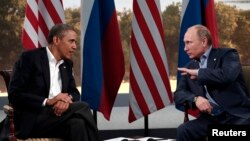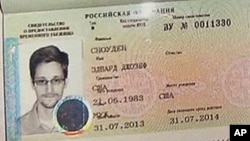WASHINGTON —
The White House has cancelled a planned summit meeting next month between President Barack Obama and Russian President Vladimir Putin and one of the reasons given was Moscow’s decision to grant asylum to an American who leaked top secret information.
The American, former intelligence contractor Edward Snowden, is wanted in the United States on espionage charges after he leaked information about how the super-secret National Security Agency (NSA) monitors U.S. and international telephone and Internet traffic.
Snowden is now living in Russia after spending more than a month in the transit area of a Moscow airport. But his plight has triggered a discussion on the issue of treason.
In other words, is Snowden a traitor?
For John Bolton, former U.S. Ambassador to the United Nations, the issue is clear.
“I do consider him a traitor. He has taken vital secrets of the United States, undoubtedly given some to China, given some to Russia — Russia and China may have them all now for what we know,” Bolton told VOA.
“Some people say well that’s not really espionage, because espionage only takes place when you give it to one government,” Bolton continued. “I’d have to say making it public is worse than espionage, because then you have 190 governments that learn America’s secrets.”
David Barrett, a national security expert teaching at Villanova University, sees Snowden in a different light.
“I would regard him as a defector. There are a lot of different names that are used to describe him: whistleblower, leaker,” Barrett said. “Sure, I’d call him a defector. This is a very serious event for a person who works for an intelligence agency, who signs documents agreeing to keep things secret. I think it is a very serious thing to reveal those secrets – to leave this country and reveal these secrets.”
Defector, traitor or whistleblower?
The U.S. Justice Department has filed criminal charges against Snowden — theft of government property, unauthorized communication of national defense information and willful communication of classified communications intelligence to an unauthorized person.
Snowden tries to justify his actions by saying one of the reasons he leaked the documents was to start a discussion about the U.S. government’s secret spying programs.
Stephen Vladeck, an expert on national security law at American University College of Law, says those discussions would not be happening now if it weren’t for Snowden’s action.
“I think it’s a good thing that they are happening,” he said. “At the end of the day, if someone asks me ‘is Edward Snowden a criminal or a whistleblower,’ I would say ‘yes’ — he’s both. And that’s okay.
“And that goes to the larger point that we have to keep in mind that sometimes doing what’s legal and doing what’s right are not necessarily the same thing,” said Vladeck.
Precise definition
Aziz Huq, an expert on national security issues and constitutional law at the University of Chicago, says one thing is for sure: Edward Snowden is not a traitor.
“We have a very precise definition of treason in American law,” Huq said. “And it’s a definition that is embedded, not just in a federal statute; it is actually embedded in the Constitution. And it refers to a very narrow class of ‘intentional forms of aiding an enemy in times of war.’”
For example, says Huq, those Americans who fought with the Nazi army were traitors — and there were treason prosecutions and executions in World War II.
“The last person who was indicted for treason, a chap named Adam Gadahn, who is an American, who went to join al-Qaida and serve as one of their English language spokesperson — there is a very strong argument for indicting him under the treason statute because he has gone and aided, in an affirmative and intentional way, an enemy of the United States. Those conditions and those cases are nothing like Snowden’s case.”
Huq says there is something “extraordinarily inappropriate about using the word 'traitor' with respect to somebody who has disclosed information that is unquestionably relevant to the public debate.”
A majority of Americans seem to agree with Huq. A recent Quinnipiac University poll says 55 percent of those questioned believe Snowden is a whistleblower, but not a traitor.
The American, former intelligence contractor Edward Snowden, is wanted in the United States on espionage charges after he leaked information about how the super-secret National Security Agency (NSA) monitors U.S. and international telephone and Internet traffic.
Snowden is now living in Russia after spending more than a month in the transit area of a Moscow airport. But his plight has triggered a discussion on the issue of treason.
In other words, is Snowden a traitor?
For John Bolton, former U.S. Ambassador to the United Nations, the issue is clear.
“I do consider him a traitor. He has taken vital secrets of the United States, undoubtedly given some to China, given some to Russia — Russia and China may have them all now for what we know,” Bolton told VOA.
“Some people say well that’s not really espionage, because espionage only takes place when you give it to one government,” Bolton continued. “I’d have to say making it public is worse than espionage, because then you have 190 governments that learn America’s secrets.”
David Barrett, a national security expert teaching at Villanova University, sees Snowden in a different light.
“I would regard him as a defector. There are a lot of different names that are used to describe him: whistleblower, leaker,” Barrett said. “Sure, I’d call him a defector. This is a very serious event for a person who works for an intelligence agency, who signs documents agreeing to keep things secret. I think it is a very serious thing to reveal those secrets – to leave this country and reveal these secrets.”
Defector, traitor or whistleblower?
The U.S. Justice Department has filed criminal charges against Snowden — theft of government property, unauthorized communication of national defense information and willful communication of classified communications intelligence to an unauthorized person.
Snowden tries to justify his actions by saying one of the reasons he leaked the documents was to start a discussion about the U.S. government’s secret spying programs.
Stephen Vladeck, an expert on national security law at American University College of Law, says those discussions would not be happening now if it weren’t for Snowden’s action.
“I think it’s a good thing that they are happening,” he said. “At the end of the day, if someone asks me ‘is Edward Snowden a criminal or a whistleblower,’ I would say ‘yes’ — he’s both. And that’s okay.
“And that goes to the larger point that we have to keep in mind that sometimes doing what’s legal and doing what’s right are not necessarily the same thing,” said Vladeck.
Precise definition
Aziz Huq, an expert on national security issues and constitutional law at the University of Chicago, says one thing is for sure: Edward Snowden is not a traitor.
“We have a very precise definition of treason in American law,” Huq said. “And it’s a definition that is embedded, not just in a federal statute; it is actually embedded in the Constitution. And it refers to a very narrow class of ‘intentional forms of aiding an enemy in times of war.’”
For example, says Huq, those Americans who fought with the Nazi army were traitors — and there were treason prosecutions and executions in World War II.
“The last person who was indicted for treason, a chap named Adam Gadahn, who is an American, who went to join al-Qaida and serve as one of their English language spokesperson — there is a very strong argument for indicting him under the treason statute because he has gone and aided, in an affirmative and intentional way, an enemy of the United States. Those conditions and those cases are nothing like Snowden’s case.”
Huq says there is something “extraordinarily inappropriate about using the word 'traitor' with respect to somebody who has disclosed information that is unquestionably relevant to the public debate.”
A majority of Americans seem to agree with Huq. A recent Quinnipiac University poll says 55 percent of those questioned believe Snowden is a whistleblower, but not a traitor.

